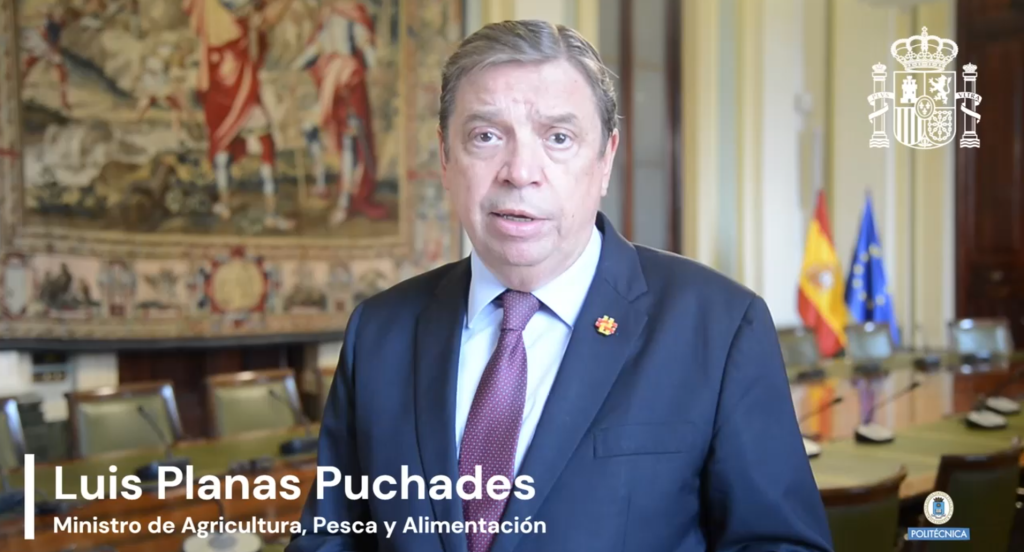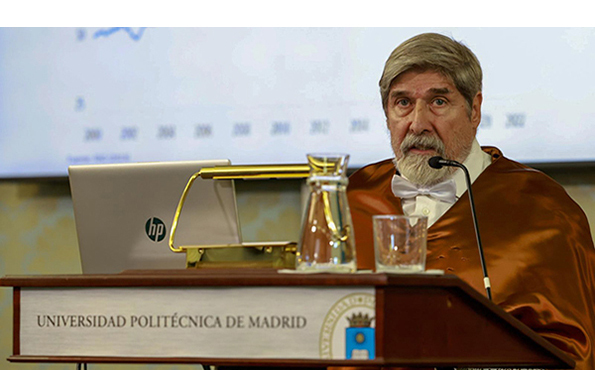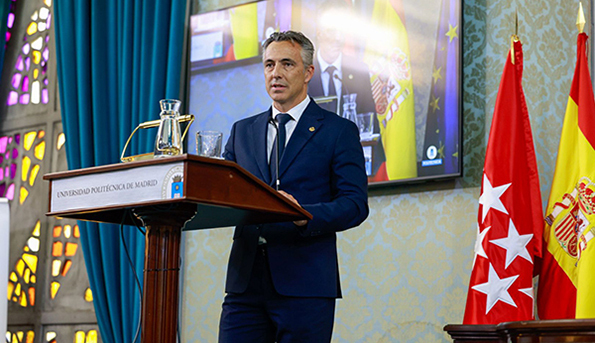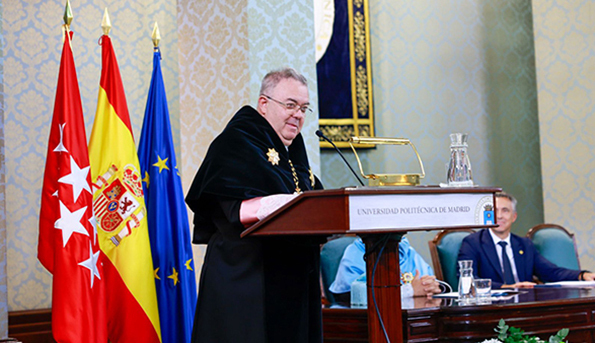Last Friday, September 27, the Opening Ceremony of the Academic Year 2024-2025 of the Universidad Politécnica de Madrid (UPM) was held, chaired by the Chancellor Guillermo Cisneros. The event was also honored with the participation of the Regional Councilor for the Environment, Agriculture and the Interior of the Community of Madrid, Carlos Novillo, and the General Director of Universities, Nicolás Javier Casas, in addition to the outstanding lecture by José María Sumpsi Viñas.
The Minister of Agriculture, Fisheries and Food (MAPA), Luis Planas, spoke telematically, highlighting the crucial role of research, teaching and innovation, particularly at the UPM, in the agri-food sector. He highlighted in his speech the close relationship between the MAPA and the ETSIAAB, helping the Ministry to take decisions with an important scientific basis in fields such as digitization or on the challenges posed by climate change.

Subsequently, the Secretary General of the UPM, Fernando Vela, presented the Report of the 2023-2024 academic year, which highlighted the main milestones of the university during the past year. Among them, he mentioned the 12 new Aula Universidad-Empresa contracts, including the Agricultural Insurance Aula signed between Agroseguro and CEIGRAM. He concluded with a mention of the European Community EELISA (European Engeneering Learning Innovation and Science Alliance), coordinated by the UPM, a European alliance to define and implement a common European engineering model.
The next to take the stage was Professor Emeritus of the ETSIAAB, José María Sumpsi, who was director of CEIGRAM from December 2016 to May 2019, as well as promoter of the idea of its creation. With a brilliant academic and institutional career, he was the one whom Chancellor Guillermo Cisneros invited to give the Inaugural Lecture, entitled: “humanity facing the challenge of hunger and malnutrition”.

He began the lecture by recalling that Malthus’ pessimistic thesis on the scarcity of food for a growing population is still unfulfilled, as a consequence of the advances in agrochemicals and genetic improvement (Green Revolution). However, the problem of hunger and malnutrition continues to be present at the global and regional levels. The economic and food crises of 2008, 2012 and also 2021 and 2022 with the consequences of the pandemic, the Russia-Ukraine war and unfavourable climatic conditions, have reversed the trend and increased food insecurity.
The global population is expected to continue to grow, albeit at a more contained rate, and this growth continues to require a 70% increase in global food production. This challenge is even greater if we consider that most of the increase must come from an increase in agricultural productivity and not from an increase in cultivated area. This, together with the impact of climate change and variability, as well as the state of degradation of natural resources, makes it difficult to achieve the goal of eliminating hunger and malnutrition in the world. Regarding technical solutions, Prof. Sumpsi was optimistic and stressed the importance of reducing food wastage along the entire food chain (19% in food availability and 12% post-harvest losses).
However, he recalled that food security is closely related to disposable income, poverty and food prices. In 2023, an estimated 10% of the world’s population did not meet minimum caloric needs. Global hunger figures hide strong regional inequalities: hunger continues to increase in Africa, has remained relatively unchanged in Asia and shows remarkable progress in Latin America and the Caribbean. Moreover, in 2023, 28.9% of the world’s population was moderately or severely food insecure.
The difficulty of ending hunger and malnutrition in the world has to do with the multiple causes that make up this problem. Among the possible political and technical solutions, he mentioned: reducing poverty levels, improving nutrition with healthy and affordable diets, ending conflicts and wars, increasing the level of spending on agriculture, food and transport, cold and storage infrastructures, improving deficiencies in global governance, limiting restrictions on food exports in the event of global food crises, among others, could have a favourable impact on Food and Nutrition Security.
In short, by 2030, it seems unlikely that SDG2, Zero Hunger, will be achieved. Rather, it is expected that between 570 and 600 million people will continue to suffer from hunger globally. The main causes of this failure are the influence of climate change (extreme weather events), political and economic instability and the persistence of conflicts and wars.
Furthermore, it is necessary to move towards a scenario in which increases in food production must be accompanied by an effort to preserve the environment and optimize the use of natural resources. One of the key elements in meeting this dual challenge will be to strengthen research centers in agriculture, agronomic engineering, environmental protection and biotechnology. The Center for Biotechnology and Plant Genome (CBGP) and the Center for Studies and Research in Agricultural and Environmental Risk Management (CEIGRAM), together with ETISAAB, are good examples of this.
However, feeding the population is not only a scientific, technological and ecological challenge, it will also be necessary to design and implement good national and global agriculture, food security and nutrition policies, create new international mechanisms and funds to increase FNS funding in countries with the highest prevalence of food insecurity and improve the global governance system for FNS. Professor José María Sumpsi concluded that hunger persists largely due to causes exogenous to agriculture. Although scientific, technological, biotechnological and agronomic advances provide hope, political and social factors remain crucial to finally achieving the desired goals.

After the Master Lecture, the Councilor for the Environment, Agriculture and Interior of the Community of Madrid, Carlos Novillo, began his speech by recalling his years as a student at the ETSIAAB, and indicated that there are a good number of examples of management strategies that favor both food production and conservation of the natural environment, such as extensive livestock farming or cultivation in pasturelands.
Closing the ceremony, the Chancellor of the UPM, Guillermo Cisneros, highlighted the role of the university as a catalyst for transformation, knowledge and transfer. In line with José María Sumpsi’s lecture, he highlighted the capacity for innovation and the importance of the Universidad Politécnica in the search for solutions to problems that affect society as a whole. After his speech, the UPM Choir gave way to the UPM Choir, officially inaugurating the 2024-2025 academic year.

